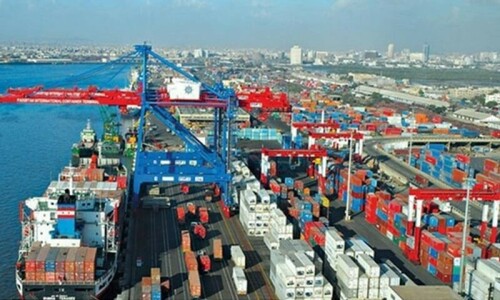BEIJING: China warned the United States on Friday that it was “not afraid of a trade war” as it threatened tariffs on $3 billion worth of US goods in retaliation over President Donald Trump’s moves against Chinese imports.
Beijing unveiled a hit list of products that could face duties of up to 25 per cent, from fresh fruit to pork and wine, though it stopped short of pulling the trigger as it indicated its readiness to negotiate an agreement.
The latest trade action sent stocks diving as fears rise that the US, which accuses China of mass theft of intellectual property and other unfair practises, could provoke a damaging trade war.
The Dow Jones Industrial Average plunged more than 700 points, while Tokyo closed 4.5pc lower, Hong Kong fell 2.45pc and Shanghai sank more than 3pc.
“China does not want to fight a trade war, but it is absolutely not afraid of a trade war,” the commerce ministry said.
Hours earlier, Trump signed an order that also could result in restrictions on Chinese investment in the US, saying it would be the “first of many” trade actions.
“We have a tremendous intellectual property theft situation going on,” Trump said as he signed the new trade order, which could include duties as high as 25pc.
The action did not immediately impose any new tariffs, but within two weeks US Trade Representative Robert Lighthizer is due to publish a list of the products that could be hit with tariffs.
US Commerce Secretary Wilbur Ross on Thursday suggested the new measures on intellectual property were a way of bringing Beijing to the table, telling CNBC they were “the prelude to a set of negotiations”.
But a senior US official later said that Washington was “not interested in creating terms for a dialogue”.
“We are interested in creating some motivation for China to actually take concrete actions to further open their markets to US exports,” the official said on condition of anonymity, adding that the two sides are constantly talking.
China’s commerce ministry warned that a 15pc tariff on 120 goods worth almost $1 billion -- including fresh fruit, nuts and wine — would be imposed if the US fails to reach a “trade compensation agreement” within an unspecified time frame.
In a second step, a 25pc tariff would be imposed on eight goods totalling nearly $2bn, including pork and aluminium scrap, after “further evaluating the impact of the US measures on China”, the statement said.
The measures were specifically in response to US steel and aluminium tariffs, which were taking effect on Friday.
The list noticeably does not include soyabeans, a key US export from Trump-voting states that Chinese state-run newspaper the Global Times had suggested should be targeted by Beijing.
Betty Wang, an economist at ANZ bank, said China’s reaction is “relatively mild”.
“From China’s perspective, it absolutely does not want to see a trade war. Coming back to the negotiation table is a relatively good result,” Wang said.
Years of ‘failed’ dialogue
US Vice-President Mike Pence hailed the new measures, saying they made it clear “the era of economic surrender is over”.
Senior White House economic advisor Everett Eissenstat said the new duties would target sectors where “China has sought to acquire an advantage through the unfair acquisition or forced technology transfer from US companies.” Lighthizer indicated the industries could include aerospace, maritime and rail transport equipment, and new energy vehicles.
The order also directs the US Treasury to develop new proposals to increase safeguards against Chinese investments in the US that could compromise national security.
In addition, the United States launched a challenge at the World Trade Organisation on Friday, saying in a statement that China appears to be breaking WTO rules by denying foreign patent holders rights “to stop a Chinese entity from using the technology after a licensing contract ends”.
Published in Dawn, March 24th, 2018













































Dear visitor, the comments section is undergoing an overhaul and will return soon.